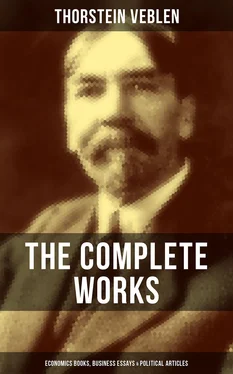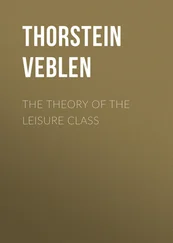Naturally, in such a cultural situation there is no appreciable accumulation of wealth and no inducement to it; the nearest approach being an accumulation of trinkets and personal belongings, among which should, at least in some cases, be included certain weapons and perhaps tools. 94These things belong to their owner or bearer in much the same sense as his name, which was not held on tenure of ownership or as a pecuniary asset before the use of trade-marks and merchantable goodwill.
The workman - more typically perhaps the workwoman - in such a culture, as indeed in any other, is a “productive agent” in the manner and degree determined by the state of the industrial arts. What is obvious in this respect here holds only less visibly for any other, more complicated and technologically full-charged cultural situation, such as has come on with the growth of population and wealth among the more advanced peoples. He or she, or rather they - for there is substantially no industry carried on in strict severalty in these communities - are productive factors or industrial agents, in the sense that they will on occasion turn out a surplus above their necessary current consumption, only because and so far as the state of the industrial arts enables them to do so. As workman, labourer, producer, breadwinner, the individual is a creature of the technological scheme; which in turn is a creation of the group life of the community.
Apart from the common stock of knowledge and training the individual members of the community have no industrial effect. Indeed, except by grace of this common technological equipment no individual and no family group in any of the known communities of mankind could support their own life; for in the long course of mankind’s life-history, since the human plane was first reached, the early mutants which were fit to survive in a ferine state without tools and without technology have selectively disappeared, as being unfit to survive under the conditions of domesticity imposed by so highly developed a state of the industrial arts as any of the savage cultures now extant. 95The Homo Javensis and his like are gone, because there is technologically no place for them between the anthropoids to the one side and the extant types of man on the other. And never since the brave days when Homo Javensis took up the “white man’s burden” for the better regulation of his anthropoid neighbours, has the technological scheme admitted of any individual’s carrying on his life in severalty. So that industrial efficiency, whether of an individual workman or of the community at large, is a function of the state of the industrial arts. 96The simple and obvious industrial system of this archaic plan leaves the individuals, or rather the domestic groups, that make up the community, economically independent of one another and of the community at large, except that they depend on the common technological stock for the immaterial equipment by means of which to get their living. This is of course not felt by them as a relation of dependence; though there seems commonly to be some sense of indebtedness on part of the young, and of responsibility on part of the older generation, for the proper transmission of the recognised elements of technological proficiency. It is impossible to say just at what point in the growth and complication of technology this simple industrial scheme will begin to give way to new exigencies and give occasion to a new scheme of institutions governing the economic relations of men; such that the men’s powers and functions in the industrial community come to be decided on other grounds than workmanlike aptitude and special training. In the nature of things there can be no hard and fast limit to this phase of industrial organisation. Its dis-appearance or supersession in any culture appears always to have been brought on by the growth of property, but the institution of property need by no means come in abruptly at any determinate juncture in the sequence of technological development. So that this archaic phase of culture in which industry is organised on the ground of workmanship alone may come very extensively to overlap and blend with the succeeding phase in which property relations chiefly decide the details of the industrial organisation, - as is shown in varying detail by the known lower cultures.
The forces which may bring about such a transition are often complex and recondite, and they are seldom just the same in any given two instances.
Neither the material situation nor the human raw material involved are precisely the same in all or several instances, and there is no coercively normal course of things that will constrain the growth of institutions to take a particular typical form or to follow a particular typical sequence in all cases. Yet, in a general way such a supersession of free workmanship by a pecuniary control of industry appears to have been necessarily involved in any considerable growth of culture. Indeed, at least in the economic respect, it appears to have been the most universal and most radical mutation which human culture by undergone in its advance from savagery to civilisation; and the causes of it should be of a similarly universal and intrinsic character.
It may be taken as a generalisation grounded in the instinctive endowment of mankind that the human sense of workmanship will unavoidably go on turning to account what there is in hand of technological knowledge, and so will in the course of time, by insensible gains perhaps, gradually change the technological scheme, and therefore also the scheme of customary canons of conduct answering to it; and in the absence of overmastering circumstances this sequence of change must, in a general way, set in the direction of great technological mastery. Something in the way of an “advance” in workmanlike mastery is to be looked for, in the absence of inexorable limitations of environment. The limitations may be set by the material circumstances or by circumstances of the institutional situation, but on the lower levels of culture the insurmountable obstacles to such an advance appear to have been those imposed by the material circumstances; although institutional factors have doubtless greatly retarded the advance in most cases, and may well have defeated it in many. In some of the known lower cultures such an impassable conjuncture in the affairs of technology has apparently been reached now and again, resulting in a “stationary state” of the industrial arts and of social arrangements, economic and otherwise. Such an instance of “arrested development” is afforded by the Eskimo, who have to all appearance reached the bounds of technological mastery possible in the material circumstances in which they have been placed and with the technological antecedents which they have had to go on.
At the other extreme of the American continent the Fuegians and Patagonians may similarly have reached at least a provisional limit of the same nature; though such a statement is less secure in their case, owing to the scant and fragmentary character of the available evidence. So also the Bushmen, the Ainu, various representative communities of the Negrito and perhaps of the Dravidian stocks, appear to have reached a provisional limit - barring intervention from without. In these latter instances the decisive obstacles, if they are to be accepted as such, seem to lie in the human-nature of the case rather than in the material circumstances. In these latter instances the sense of workmanship, though visibly alert and active, appears to have been inadequate to carry out the technological scheme into further new ramifications for want of the requisite intellectual aptitudes, - a failure of aptitudes not in degree bbbut in kind.
The manner in which increasing technological mastery has led over from the savage plan of free workmanship to the barbarian system of industry under pecuniary control is perhaps a hazardous topic of speculation; but the known facts of primitive culture appear to admit at least a few general propositions of a broad and provisional character. It seems reasonably safe to say that the archaic savage plan of free workmanship will commonly have persisted through the palaeolithic period of technology, and indeed somewhat beyond the transition to the neolithic. This is fairly borne out by the contemporary evidence from savage cultures. In the prehistory of the north-European culture there is also reason to assume that the beginnings of a pecuniary control fall in the early half of the neolithic period. 97There seems to be no sharply definable point in the technological advance that can be said of itself to bring on this revolutionary change in the institutions governing economic life. It appears to be loosely correlated with techno-logical improvement, so that it sets in when a sufficient ground for it is afforded by the state of the industrial arts, but what constitutes a sufficient ground can apparently not be stated in terms of the industrial arts alone. Among the early consequences of an advance in technology beyond the state of the industrial arts schematically indicated above, and coinciding roughly with the palaeolithic stage, is on the one hand an appreciable resort to “indirect methods of production”, involving a systematic cultivation of the soil, domestication of plants and animals; or an appreciable equipment of industrial appliances, such as will in either case require a deliberate expenditure of labour and will give the holders of the equipment something more than a momentary advantage in the quest of a livelihood. On the other hand it leads also to an accumulation of wealth beyond the current necessaries of subsistence and beyond that slight parcel of personal effects that have no value to anyone but their savage bearer.
Читать дальше












